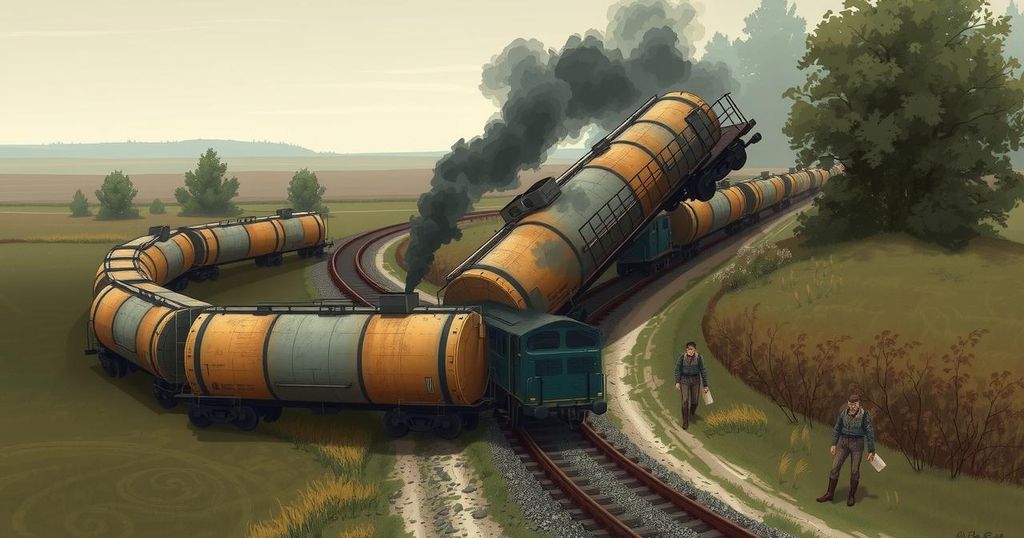Train Derailment in Matanzas: Transport Minister Addresses Rail Safety Issues
Cuba’s Transport Minister Eduardo Rodríguez Dávila addressed a recent train derailment in Matanzas involving Tren Extra 924, which derailed five tanker cars carrying rum. Fortunately, there were no casualties, but the event highlights issues with railway infrastructure. Emergency measures were activated, and an investigation is underway to determine the causes, as this incident is part of a worrying trend of railway accidents in Cuba.
Cuba’s Minister of Transportation, Eduardo Rodríguez Dávila, has made remarks about a significant train derailment that occurred recently in Matanzas, specifically near the Mocha station at kilometer 80.500 on the Central Line. This incident has disrupted railway operations in the area, causing widespread concern. The train, known as Tren Extra 924, was transporting rum from the “Meláneo Hernández” distillery to a factory in Santa Cruz del Norte when five of its tanker cars derailed.
In what could have been a catastrophic event, one of the tank cars overturned and subsequently caught fire, while two others were left partially overturned. Fortunately, two cars remained on the track, affecting about 100 meters of railway. In a Facebook post, Rodríguez Dávila asserted that the derailment represents “something more than a railway accident.” He was reportedly monitoring work at the Havana Bay tunnel when he learned of the incident and promptly headed to the scene for a firsthand evaluation.
Following the derailment, emergency protocols were put in place to assist those impacted, including delays for the Havana to Holguín train service while the Guantánamo to Havana route was temporarily suspended. “An investigation is underway to ascertain the factors that led to the derailment,” underscores Rodríguez Dávila, who expressed relief that no human lives were lost in the calamity.
Recent months have witnessed multiple railway accidents across Cuba. A notable event occurred in April of the previous year when a national train derailed on the Holguín to Havana route in Las Tunas, without injuries reported. Preceding incidents, such as a freight train collision in Sancti Spíritus in December 2024, were attributed to violations of regulatory protocols and have raised alarm regarding railway safety standards.
The frequency of railway accidents is prompting discussions about the state of Cuba’s transport infrastructure. Official reports indicate a downward trend in maintenance and safety, exacerbating the national economic challenges. A derailed passenger train in Matanzas in September 2024 and another incident involving the Manzanillo-Havana route in August highlight ongoing issues that plague the country’s rail system.
When examining the circumstances surrounding the Matanzas derailment, it’s critical to consider the broader implications on transportation in Cuba. Questions have emerged regarding the state of the country’s railway infrastructure, a topic of increasing focus as repeated incidents raise eyebrows. The overall condition of railway operations is shedding light on deeper issues involving infrastructure degradation and regulatory violations that frequently lead to these dangerous occurrences.
In summary, the recent train derailment in Matanzas has highlighted the serious challenges facing Cuba’s railway system. Transport Minister Eduardo Rodríguez Dávila’s statements reflect concern not only for immediate safety but also for the underlying infrastructure problems that have led to repeated accidents. While this incident thankfully resulted in no casualties, it underscores the urgent need for comprehensive assessments and improvements in railway operations across the nation. The situation calls for both evaluation and action to address the continuing deterioration of Cuba’s transport network, which critically affects economic stability and public safety.
Original Source: en.cibercuba.com




Post Comment